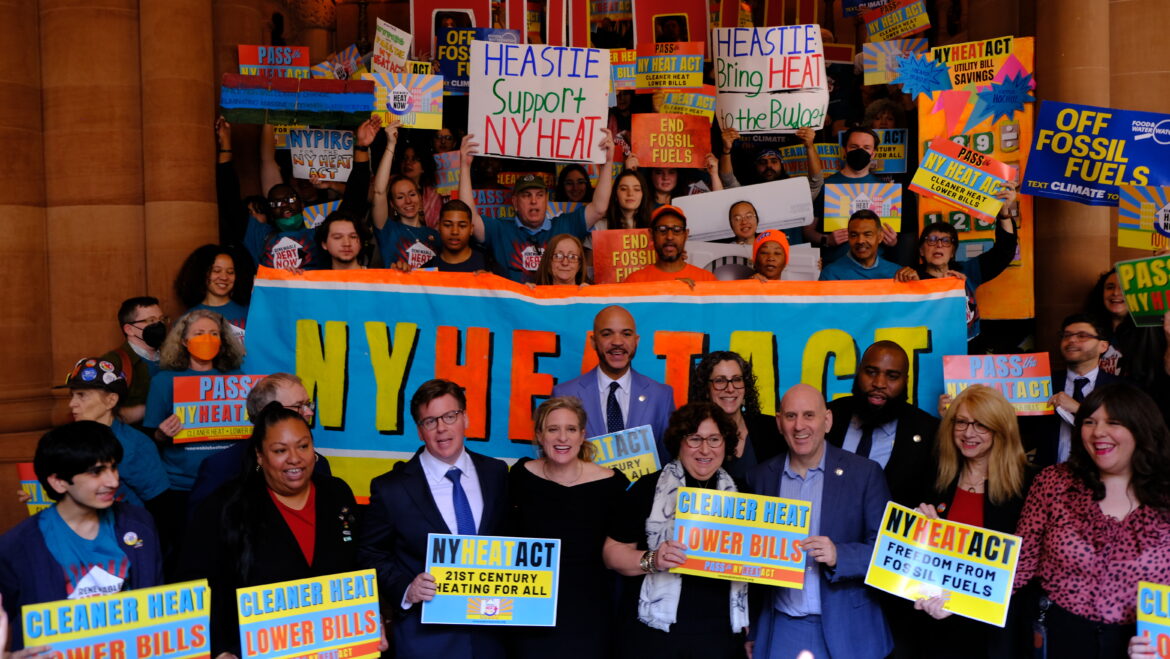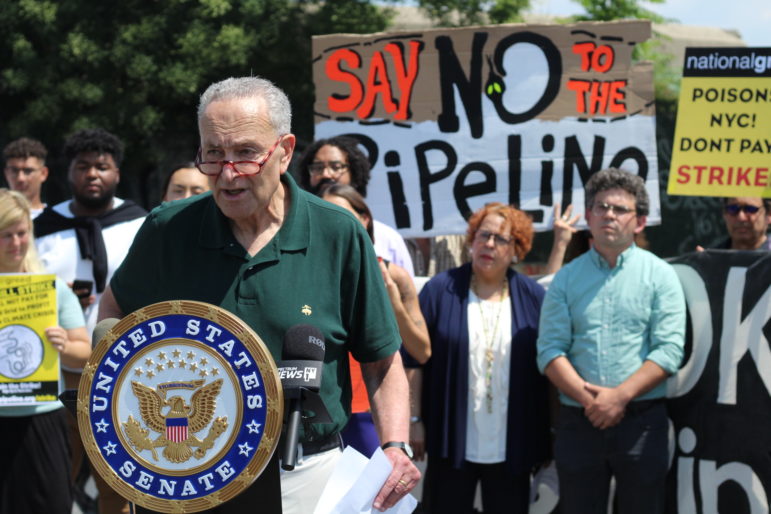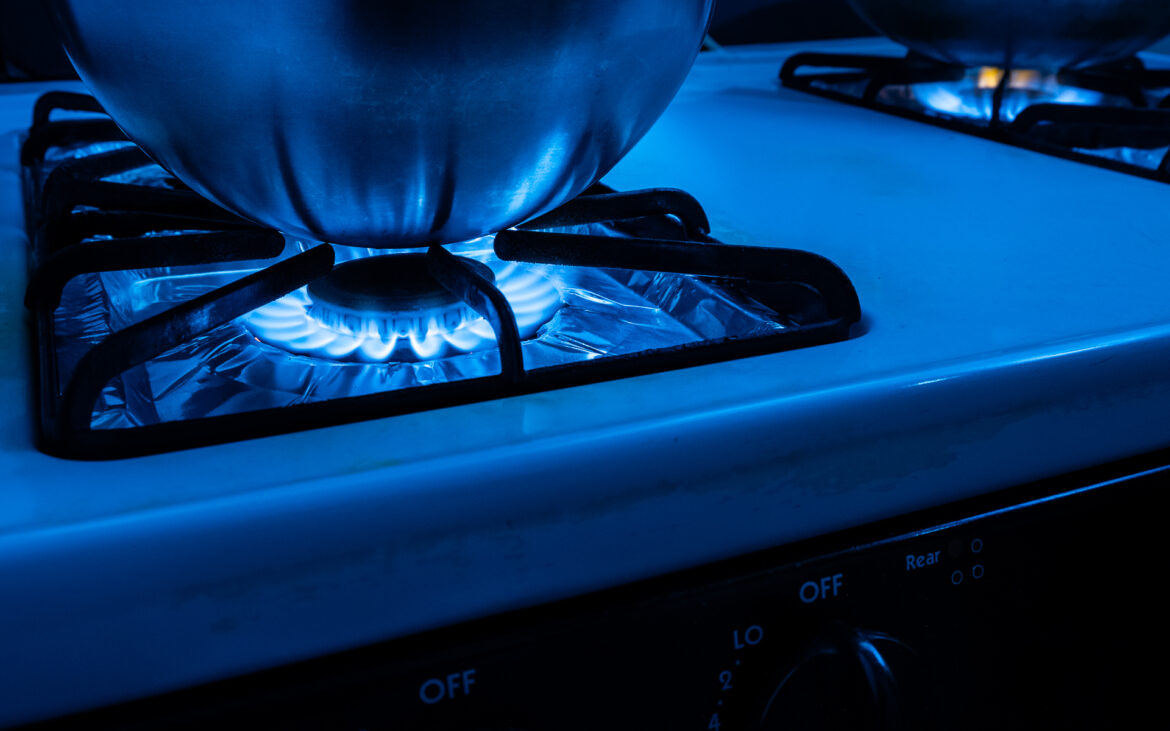The bill includes a provision that has the power to curb the expansion of gas infrastructure in New York. “Why put new gas pipes in the ground for new construction, when we’ve already passed laws saying we should be moving away from using gas?” the bill’s sponsor Senator Liz Krueger told City Limits.

Courtesy Luis Guillermo Garcia
Lawmakers and environmental groups rallying in Albany for passage of the NY Heat Act.As New York lawmakers debate how to spend billions in the state’s budget, due in early April, environmental groups have joined forces to get a big ticket bill incorporated into the final plan: the New York Heat Act.
If it gets included, the bill passes automatically and then waits for the governor’s signature to officially become law. The Senate passed the bill last week, so if it fails to make the budget it could still become law as long as the Assembly gives it their own vote of approval before the session ends in June.
But environmental groups want it to go through as quickly as possible, and here’s why: it would stop utility companies from building out more polluting gas infrastructure under the premise that they are legally obligated to serve gas in New York. The state’s public service law currently requires gas utilities to provide service to all customers who request it.
“The utilities are absolutely using the obligation to serve as an excuse to continue to expand the gas system and to continue to invest in gas instead of more cost effective [green] alternatives,” said Jessica Azulay, program director of the environmental justice coalition Alliance for a Green Economy (AGREE).
Although natural gas is a fossil fuel that heavily contributes to climate change, gas utilities say building more gas infrastructure is necessary to deliver reliable energy to customers, and have joined forces with unions in criticizing the bill.
They say it would cost jobs in the industry, and that it’s too risky to force homeowners to shift to electricity produced from renewable sources because they are still scarce on the market. Just 27 to 29 percent of the state’s electricity currently comes from renewable energy.
But advocates argue that the money spent to lay out more gas infrastructure could be diverted towards advancing clean energy projects instead. The move could bolster the green economy, creating jobs and helping the state reach its climate goals.
Five years ago New York passed the Climate Leadership and Community Protection Act (CLPCA), which requires the state to phase out the use of climate change-inducing fossil fuels like gas and have 70 percent of its power come from renewable energy by 2030.
Despite that, gas utilities have continued expanding. They have spent nearly $5 billion to maintain and expand gas infrastructure since the CLCPA’s passage, and plan to spend a total of $28 billion by 2043, according to a report by the Building Decarbonization Coalition.
“Why put new gas pipes in the ground for new construction, when we’ve already passed laws saying we should be moving away from using gas?” the bill’s sponsor Senator Liz Krueger told City Limits.
“New York Heat helps us speed along the process [of moving off of gas] which is crucial because climate change is accelerating and we’re fighting against time,” she added.

Liz Donovan
Lawmakers and activists at a 2021 rally in Brooklyn opposing a gas pipeline.Overriding the Climate Act
The NY Heat Act would do a variety of things, like cap the utility bills of low- and middle-income New Yorkers so that they don’t exceed 6 percent of a household’s income.
The legislation would also get rid of the 100 foot rule, a legal requirement for utility companies to provide gas service at no charge to anyone who wants it and lives within 100 feet of an existing line. Nixing the rule would save New Yorkers up to $200 million annually, advocates say, since the cost for these hookups are baked into the rates utilities charge paying customers.
But NY Heat also includes an arguably more important clause: it changes the language in the public service law that obligates utilities to serve their customers gas.
The law says that “gas, electric and steam service” must be provided “to all residential customers” because it is necessary for preserving “the health and general welfare” of the population and is “in the public interest.”
NY Heat would amend that rule by getting rid of the word “gas” to open utility companies up to offering non-polluting energy alternatives to customers. The provision would also add that providing such services is necessary for “the achievement of the state’s climate justice and emission reduction mandates.”
“Right now, our existing public service law is actually not in alignment with our state’s climate goals because of this preference for gas,” said Liz Moran, policy advocate at the environmental group EarthJustice.
Environmentalists say the Public Service Commission (PSC), the regulatory agency that keeps the utilities in check, has used the public service law to override the state’s Climate Act when gas expansion projects get contested by environmental activists.
“The PSC’s interpretation has been that they must follow their obligation to serve gas and to provide free gas hookups under the 100 foot rule over the [state’s climate act]. And it’s very frustrating because both of these laws should be valid,” Azulay from AGREE told City Limits.
In an emailed statement, the Public Service Commission said that it “takes its role in meeting the requirements outlined in the Climate Act seriously, while upholding its statutory objectives to ensure safe and reliable service at just and reasonable rates.”
The Commission also pointed out that utilities are required by law to provide gas service and not other alternatives and claims that any expansion projects aimed at keeping gas flowing in a safe, reliable manner, must be approved.
A spokesperson for National Grid, one of the largest utility companies in New York, told City Limits in an email that they are not against making changes to their obligation to serve new customers. But, “we are opposed to changing the obligation to serve existing customers who must retain robust protections to ensure reliable and affordable energy to heat their homes and businesses,” the spokesperson added.
Azulay argues, however, that it’s possible to both provide reliable energy to customers while still following the state’s climate mandates.
“NY Heat harmonizes the public service law with the climate act by encouraging utility companies to substitute gas pipes for [clean energy] alternatives that ensure we’re moving people off of the [gas] system,” Azulay explained.
So when utility companies need to swap out old gas pipes that are prone to leaks with new ones, the NY Heat Act would come into play and encourage utility companies to look into using less polluting options instead. Green solutions to heating and cooling homes include installing environmentally friendly heat pumps or laying down the water pipes needed to connect multiple buildings to sources of thermal energy deep underground.
Advocates say that by trading in gas hookups for clean energy in entire neighborhoods, utility companies would help “decarbonize”—or stop buildings from releasing the carbon emissions that lead to climate change—at a larger scale.
“I really see the change in the obligation to serve as the most important provision at the heart of this bill,” said Allison Considine, senior campaign manager at the environmental group Building Decarbonization Coalition (BDC). “It just unlocks the ability to invest in neighborhood scale decarbonisation efforts in a way that avoids this spiral of increasing costs spent on the gas system.”
In New York state it costs anywhere from $3 million to $10 million to replace one mile of “leak prone pipe,” according to the Building Decarbonization Coalition. Since residents are all connected to the same gas system, the cost of maintaining gas infrastructure is baked into everyone’s energy bills.
“It’s just going to be cheaper to stop spending that money on gas maintenance and start spending it on providing people with heat pumps and electric stoves. And with the added benefit that we’ll be using less energy overall with those technologies because they are so much more efficient and we will also have cleaner air to boot,” said Considine.
“But unfortunately because the fossil fuel industry wants to stay alive, it’s been in their best interest to obscure that,” she added.

Adi Talwar
A gas stove.Push back
The fossil fuel industry has joined forces with labor unions to stop the NY Heat from passing.
New Yorkers for Affordable Energy, a coalition that advocates for increased access to natural gas,* said in a press release earlier this year that the legislation “threatens good paying union jobs at a time when our state can ill afford such losses.”
It would “raise rates, cost jobs and eliminate consumer energy choice in NY,” the association said in a social media post last week, when the group held a press conference with several Republican state senators opposing the bill.
The union, American Federation of Labor and Congress of Industrial Organizations (AFL-CIO), has also come out against it. In an emailed statement, they highlighted the need for the legislation to include more “robust labor standards” and said New York can’t get off gas until the renewable energy sector is further developed.
“It is premature to consider this measure until clean energy development meets the needs of all New Yorkers. This includes ensuring workers in the fossil fuel industry, manufacturing, and other energy-intensive sectors are protected,” said Mario Cilento, president of the New York State AFL-CIO.
Senator Krueger told City Limits she understands the concerns of those who fear losing their jobs to a changing market. “But we’ll continue to say, and most unions agree with us by the way, that there are more opportunities for good union jobs in a green economy than in the current economy,” Krueger said.
Despite the opposition, the bill has gained momentum in Albany this legislative session. It passed the Senate last week and made it into Gov. Kathy Hochul’s budget proposal, although not in its entirety—she nixed the part ensuring that utility bills do not exceed 6 percent of household incomes.
“Governor Hochul’s Executive Budget makes record-setting investments in New York’s future while ensuring the state remains on a stable long-term fiscal trajectory, and she will work with the Legislature to craft a final budget that achieves these goals,” a spokesperson said.
Meanwhile the Assembly, which failed to pass the bill last year, has yet to weigh in this session—but Krueger is hopeful they won’t stop the bill in its tracks this time around.
“There are many assembly members, who are very strong advocates for the bill, coming to press conferences and rallies,” the senator said.
The legislation would be in line with other efforts by the state to move away from the use of fossil fuels. A ban on gas stoves in new construction that will take effect starting in 2026 has faced similar resistance from the gas industry.
“So frankly, the problem is that gas oil companies are busy putting out false information about New York Heat as they are doing on a number of other environmental bills,” she added.“In general, anything that moves us into a greener electric world is a threat to companies whose money is made on oil and gas systems for sure.”
*A previous version of this story incorrectly listed National Grid as a current member of New Yorkers for Affordable Energy. The utility is no longer associated with the group, according to a spokesperson.
To reach the reporter behind this story, contact Mariana@citylimits.org. To reach the editor, contact Jeanmarie@citylimits.org
Want to republish this story? Find City Limits’ reprint policy here.








